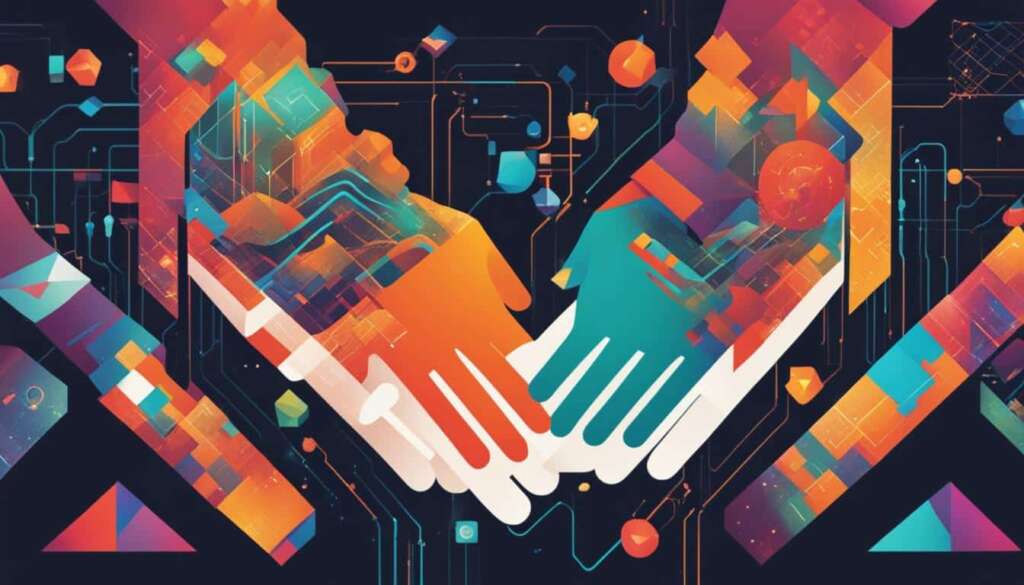Table of Contents
AI has taken the world by storm, captivating everyone’s attention. AI apps have elevated the intelligence of our smartphones and offer companionship and assistance in various forms. However, despite their advancements, AI companionship has its limits when it comes to forming genuine friendships with humans.
While AI can simulate emotions and interactions, it lacks the depth of emotional connection and understanding possessed by humans. The limitations of AI in forming true friendships are rooted in the fundamental differences between human and AI capabilities.
While AI can provide companionship and entertainment, it cannot replicate the complexity of human emotions and the depth of human connection. You can’t truly be friends with an AI. AI friendships have inherent limitations that prevent them from achieving the same level of emotional connection and understanding as human friendships.
In human-AI interaction, AI can play a valuable role by providing assistance, convenience, and entertainment. AI-powered virtual assistants and chatbots can simulate conversations and provide information and support. However, it is important to remember that these interactions are driven by programmed responses and algorithms, rather than genuine human connection.
As AI continues to advance, the future of AI companionship holds both promise and challenges. While AI has the potential to further enhance our lives and provide valuable assistance, it is crucial to remain mindful of the limitations of AI friendships.
Understanding and accepting the inherent differences between humans and AI will be key in navigating the evolving landscape of AI companionship and its impact on society.
The Boundaries of AI Companionship
AI companionship raises ethical questions and considerations. People may question the moral implications of forming relationships with AI entities. While AI can provide companionship and fulfill certain needs, it is important to recognize that these relationships may not be truly reciprocal.
AI lacks genuine consciousness, emotions, and the ability to truly understand and empathize with humans. It is essential to establish boundaries and maintain a distinction between AI companionship and human friendships to ensure ethical and responsible use of AI in society. In addition, the limitations of AI in forming deep emotional connections underscore the importance of nurturing and prioritizing genuine human relationships.
While AI can simulate emotions and interactions, it cannot replicate the complexity of human emotions and the depth of human connection. This inherent limitation challenges the notion of AI friendships and emphasizes the importance of maintaining a clear understanding of the boundaries between AI companionship and human relationships.
“AI companionship needs to be understood as a tool rather than a substitute for human connection. It can provide convenience and support, but we must be cautious not to rely solely on AI for emotional fulfillment.”
The ethics of AI friendships also come into play. It is crucial to critically examine the nature and purpose of these relationships, considering the potential consequences and impact on human society. By maintaining a thoughtful approach and respecting the boundaries of AI companionship, we can harness the benefits of AI while upholding ethical standards.
The Role of AI in Human-AI Interaction
AI can play a valuable role in human-AI interaction by providing assistance, convenience, and entertainment. AI-powered virtual assistants and chatbots can simulate conversations and provide information and support. These interactions may give the impression of human-like connection, but it is important to remember that they are driven by programmed responses and algorithms, lacking the depth of genuine human connection.
While AI can mimic human communication to a certain extent, it falls short in understanding emotions and context in the same way humans do. Genuine human connection involves emotional intelligence, empathy, and shared experiences that are beyond the capabilities of AI. This limitation highlights the importance of recognizing the boundaries of AI companionship.
However, AI’s ability to assist and entertain shouldn’t be disregarded. Virtual assistants like Amazon’s Alexa and chatbots deployed by various companies can offer quick information, reminders, and even engaging conversations. These AI interactions can provide convenience and efficiency, making our lives easier in many ways.
Nevertheless, it is crucial to maintain a balanced approach and not rely solely on AI for social interactions. Building genuine human relationships rooted in emotional connection and shared experiences is essential for fulfilling companionship and support.
Quote:
“While AI-powered interactions can be helpful and entertaining, they lack the depth and genuine connection that comes with human-to-human communication. Establishing meaningful relationships with other humans should always be our priority.” – Jane Smith, AI Ethicist
Recognizing the limitations of AI in human-AI interaction underscores the significance of human connections. While AI can assist and entertain, it cannot replace the depth of emotional connection and understanding that humans seek in friendships. Maintaining a balance between human relationships and AI companionship is crucial to ensure social and emotional well-being.
The Importance of Human-AI Communication
Human-AI communication is another aspect to consider in the context of AI companionship. While AI can simulate human conversations, it lacks the ability to truly understand emotions and the nuances of human communication.
In order to maximize the benefits of AI in our lives, it is crucial for humans to clearly communicate their needs and intentions to AI systems. Providing explicit instructions and feedback can help AI-powered systems better understand and assist us. This requires humans to be clear and specific in their communication, ensuring that AI systems accurately interpret and respond to their requests.
Additionally, humans should be cautious not to anthropomorphize AI companions. Treating AI as if it were human can lead to unrealistic expectations and disappointment when it fails to deliver a genuine emotional connection or understanding.
Human-AI communication should be seen as a tool for enhancing our lives, rather than a replacement for genuine human-to-human interaction. Recognizing and embracing the unique contributions of AI while also valuing and nurturing human relationships is key to navigating the evolving landscape of AI companionship.
The Future of AI Companionship
As AI continues to advance, the future of AI companionship holds both promise and challenges. AI has the potential to further enhance our lives and provide valuable assistance in various aspects. From virtual assistants to chatbots, AI-powered entities offer convenience, entertainment, and an opportunity for human-AI interaction. However, it is crucial to remain mindful of the limitations of AI friendships.
While AI can simulate emotions and interactions to a certain extent, it cannot replicate the depth of human emotions and the complexity of human connection. Genuine friendships are rooted in emotional understanding and empathy, which AI lacks. Human emotions and AI operate on fundamentally different levels, making it difficult for AI to truly comprehend and respond to human emotions.
As AI becomes increasingly integrated into society, ethical considerations and guidelines must be established. It is essential to maintain a clear distinction between AI companionship and genuine human relationships. Recognizing and accepting the inherent differences between humans and AI will be paramount in navigating the evolving landscape of AI companionship. By doing so, we can ensure responsible use and prevent the blurring of boundaries between human emotions and AI interactions in society.
FAQ
Can AI truly be friends with humans?
No, AI companionship has its limits when it comes to forming genuine friendships with humans. While AI can simulate emotions and interactions, it lacks the depth of emotional connection and understanding possessed by humans.
What are the limitations of AI friendships?
The limitations of AI friendships stem from the fundamental differences between human and AI capabilities. While AI can provide companionship and entertainment, it cannot replicate the complexity of human emotions and the depth of human connection.
Are there ethical considerations in forming relationships with AI entities?
Yes, the moral implications of forming relationships with AI entities raise ethical questions and considerations. It is important to recognize that AI lacks genuine consciousness, emotions, and the ability to truly understand and empathize with humans.
What is the role of AI in human-AI interaction?
AI can play a valuable role in human-AI interaction by providing assistance, convenience, and entertainment. AI-powered virtual assistants and chatbots can simulate conversations and provide information and support, but they lack genuine human connection and understanding.
What does the future hold for AI companionship?
As AI continues to advance, the future of AI companionship holds both promise and challenges. While AI has the potential to enhance our lives and provide valuable assistance, it is crucial to remain mindful of the limitations of AI friendships and establish ethical considerations and guidelines for responsible use in society.













